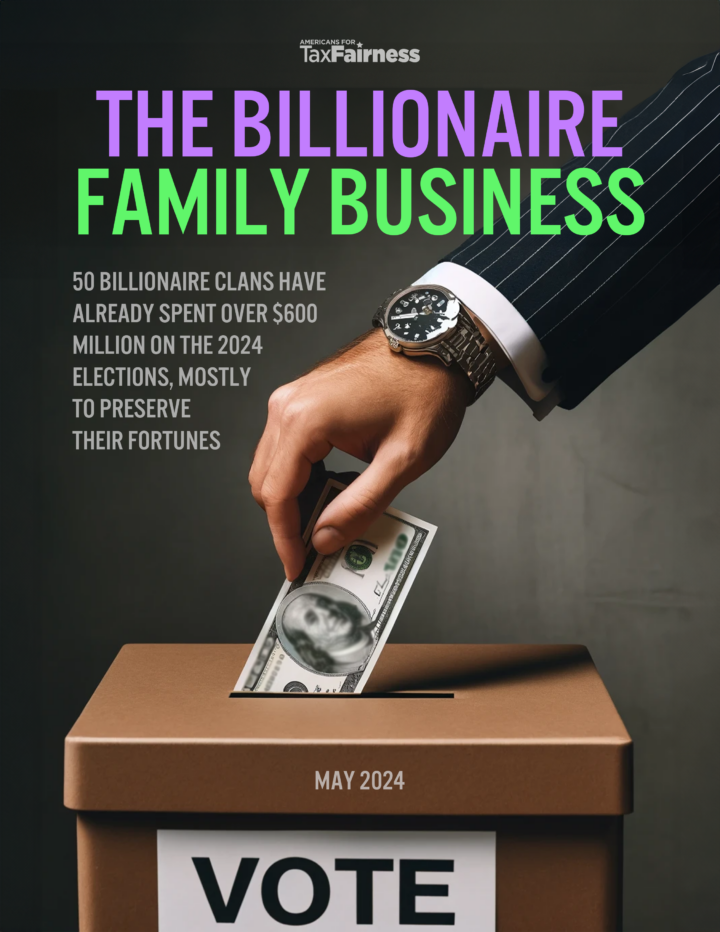Read the full report here.
Introduction
Just 50 billionaire families have already injected more than $600 million collectively into the crucial 2024 elections, with that number sure to show accelerating growth in the final six months of the campaign. These billionaire clans donated the $600 million mostly to political parties, political action committees (PACs) and outside spending groups (Super PACs) as of May 9, offering further proof that the nation’s richest families consider democracy just another commodity they can buy.
This is the latest in a series of “billionaires buying elections” reports from Americans for Tax Fairness (ATF). It is the first in the series to look beyond the political donations of individual billionaires to those of billionaire families. Wealth is a family affair, so this broader frame provides a more accurate picture of how the country’s great family fortunes are being wielded in the political arena.
Over two-thirds (69%, or $416 million) of the contributions from America’s biggest billionaire-family donors supported Republican candidates and conservative causes. Less than a quarter (23% or $137 million) backed Democratic office-seekers and progressive positions. (There is no clear partisan label for the remaining 8% of donations.)
That pronounced GOP tilt is a sign that the political spending of billionaire families is largely an investment in preserving familial wealth and power. That’s because it is Democrats, including President Biden, who are pushing for more effective taxation of great wealth, the income generated by that wealth, and the transfer of wealth between generations. Republicans advocate for just the opposite: lower taxes on the rich, on the corporations they control and on the great inheritances that perpetuate and exacerbate wealth inequality.
We need more effective taxation of billionaires and on intergenerational wealth transfers, as well as tighter campaign-finance laws, to curb this power grab by America’s economic dynasties.
Key Facts
- The 50 billionaire families who had injected the most money into the political system as of May 9 donated at least $600 million to political parties, political action committees (PACs) and super PACs.
- Over two-thirds (69%) of the money has been in support of Republican candidates, less than a quarter (23%) has backed Democratic candidates, and the remaining 8% can’t be classified on a partisan basis.
- Even among these top 50 spending families, donations are highly concentrated: the top ten clans–including prominent conservative families the Kochs, Mellons and Waltons–have contributed over half the total ($359 million).
- The 50 billionaire mega-donor families in the study are collectively worth over $1 trillion, meaning the $600 million they’ve spent on politics only equals 0.06% of their total wealth. The equivalent donation for the average household would be about $100, so these 50 billionaire families alone have the political-spending capacity of over 6 million ordinary American families.
- The total political spending by these 50 families is undoubtedly higher than shown here. In order to focus on the kind of big donors who expect their money to buy them influence, only contributions of $10,000 or more were included. Because of campaign finance limits, that minimum excludes donations directly to candidates. Also, billionaires can impact elections through unlimited contributions to so-called “dark money” groups that don’t reveal their donors and are therefore not included in these totals.
- The political free-spending of billionaire families is only possible because of a broken campaign-finance system; and is facilitated by the ineffective taxation of billionaires and of billionaire inheritances, which leave economic dynasties with plenty of spare cash to try to influence elections.
- Campaign finance rules should be reformed to outlaw the unlimited political contributions that give billionaire families an outsized say in our political process. Special taxes should be enacted to tax billionaire wealth or at least all the income from their wealth, and the estate tax should be strengthened to curb the growth of economic dynasties.
